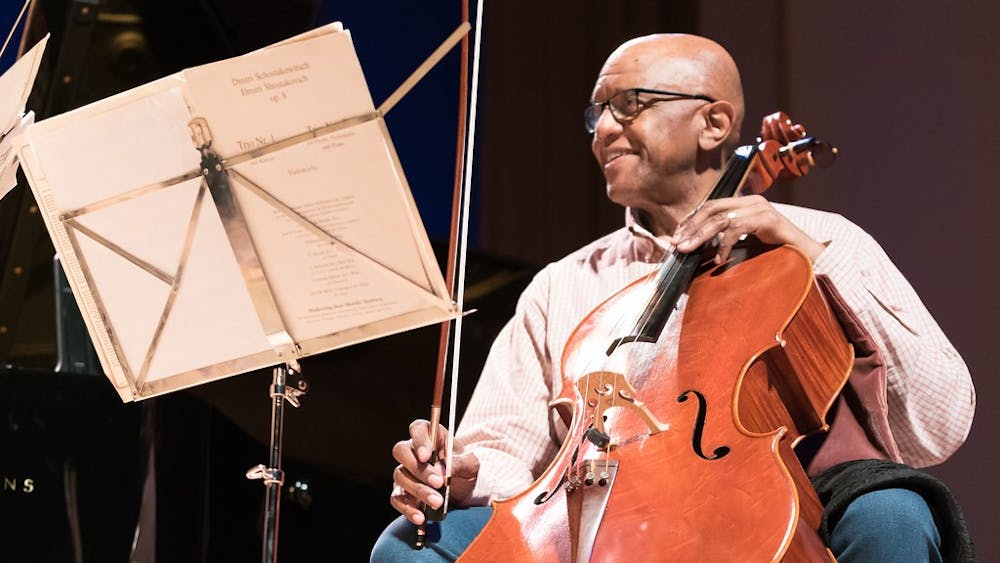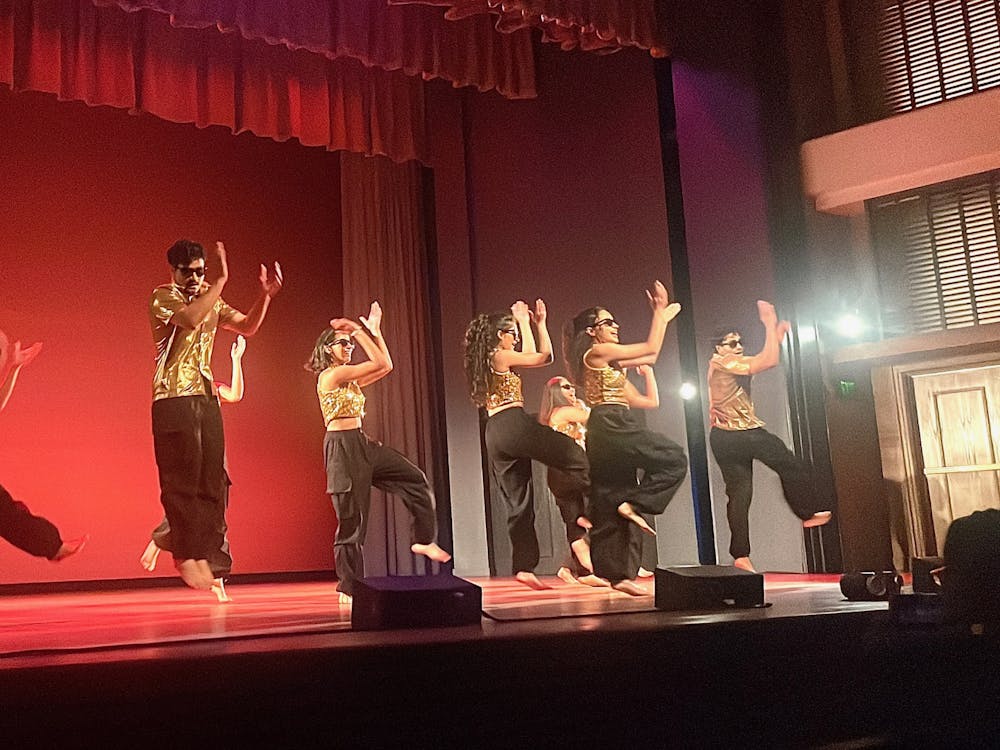The gentle notes of Johann Sebastian Bach's Goldberg Variations filled the Camp Concert Hall promptly at 4 p.m. last Thursday.
A chorus of voices had swelled in anticipation just before the keys of the piano were played by Director of Accompaniment Joanne Kong as members of the University of Richmond community came together to celebrate the contributions of Ronald Crutcher, the 10th president of UR, and Betty Neal Crutcher, his wife, to the community.
The Crutchers made an impact that faculty, staff, students and alumni reflected on with fondness for the duo who became a beloved part of the UR community during a six-year tenure.
Keith McIntosh, vice president and chief information officer, opened the event with a message of gratitude for Crutcher and his leadership, dedication and steadfast support.
McIntosh, who is Black, said that seeing a Black man as the president of UR -- as Crutcher was the first Black man to serve in the role in UR's 191-year history -- set an example for higher education leadership.
This was echoed by Roger Gregory, United States Court of Appeals Chief Judge for the Fourth Circuit, who met Crutcher in 2015 as a member of the Presidential Search Committee when Crutcher was interviewed as a finalist for the position.
"He understood what was going on in higher education far beyond Richmond, [...] what was going on at the higher echelons in every aspect of higher education," he said. "His exposition of the institution's missions and priorities to students, faculty and donors alike, was clear and rich in tone, and like this openness his leadership approach was expansive."
Gregory said Crutcher had given equal importance to the essential instruments of the alchemy of UR: student, faculty and the foundation. The reflection of Crutcher's leadership in higher education was interspersed with musical selections befitting of his own musical career as a classical cellist.
Jennifer Cable, professor of music, considered how Crutcher's musical training had prepared him for leading an institution of higher education using five principles.
The fifth principle is to know when one is and is not the soloist, she said.
"Musicians understand that no matter where one six in the orchestra, or in the choir, or in the quartet or on stage in the opera, everyone's voice is necessary," she added.
"We collaborate together for the sake of the outcome, everyone's contribution is crucial to the whole. And everyone's voice matters."
Enjoy what you're reading?
Signup for our newsletter
Manuella Meyer, professor of history, provided a reflection of Crutcher's humility in leadership, especially in moments when UR has faced internal and external pressure.
Meyer cited UR's recent grappling with its institutional connections to slavery that had centered on the naming of two buildings on campus -- Ryland Hall and Mitchell-Freeman Hall.
"Dr. Crutcher was criticized by some for not taking unilateral actions like striking names from buildings," Meyer said. "His suggestions to keep the names and to add to them deeper interpretive contexts, along with making known those of African ancestry connected to YR enrichment on campus were seen as not radical, or substantive. The management of modern day silences and lived history, along with the balance of inclusivity and revisionism are controversial again today.
"We know that there are no simple ways through moments like these in conflict, it can be too easy to see each win as necessitating an equal and opposite loss. What I think we do know though is that dialogues matter."
Messages of gratitude from UR alumni and Virginia leaders, including Gov. Ralph Northam, Mayor Levar Stoney, Sen. Jennifer McClellan and Sen. Ghazala Hashmi were broadcasted in tribute to Crutcher. Leaders in higher education, including Richard Eckman, president of the Council of Independent Colleges, and Ted Mitchell, president of the American Council on Education, shared messages shortly after.
Director of Parent Philanthropy Terry Heilman Sylvester, UR’ 76, reflected Meyer's sentiment that Crutcher had made an impact on UR through his willingness to be open with the community and share his personal experiences in a time when the United States was facing issues similar to those at UR.
Many speakers thanked Crutcher directly for encouraging openness in a way that supported the diversity, equity and inclusion efforts that he championed as president.
"I am grateful to be a part of a community that embraces individuality, diversity, as well as diverse perspectives, a community that is intentional and making you are an inclusive and anti-racist environment catalyzed by the spirit, honesty, self-reflection and compassion of Dr. Crutcher," Director of Institutional Effectiveness Melanie Jenkins said.
Crutcher was not the only figure celebrated that afternoon for achievements that touched the lives of many UR community members.
A tribute to Betty Neal Crutcher was provided by Tina Cade, associate vice president and director of multicultural affairs, and Linda Hobgood, director of the Speech Center and faculty member of rhetoric and communication studies.
Cade described the close nature of her relationships with community members, and how people had been blessed by that connection.
"Betty, I have said to you, you have that uncanny way of looking at a person [...] and thoroughly understanding exactly who they are," Cade said. "She could read them to their soul. And in that glance, she knows just who they are, she knows what their values are, she knows about their struggles. She knows about their needs."
Together, the Crutchers became a dynamic duo.
"We owe much to Ron and Betty, whose teamwork has been such an example," Hobgood said. "Knowing and celebrating each other's strengths, they harmonize as wisdom and instincts guide them."
Some of their smallest interactions with community members were highlighted fondly during the afternoon, such as the Crutchers' willingness to carry boxes, bags, luggage and everything in between to students' dorms on move-in day every year.
A hallmark of the Crutchers' personal relationships with students was the formation of mentor groups with a select number of students -- one male group and one female.
Alec Greven, UR '21, was a member of Crutcher's mentor group during the four years of his college career. Greven first met Crutcher as a prospective student and the two later formed a closer relationship in working on UR's commitment to free expression, he said.
"Having a conversation with President Crutcher is always meaningful because he has the great ability to make you feel both special and heard," Greven said. "President Crutcher's warmth, compassion and desire to get personally involved on campus and in the lives of his students, is something that I came to admire about him. He was dedicated to making a personal and profound difference in the lives of students at the University of Richmond, and I certainly experienced full force of that dedication firsthand."
India Henderson, UR '21, was a member of Betty Neal Crutcher's mentor group, she said. Henderson reflected on the lessons that Crutcher imparted on her during their conversations, even when Henderson's questions were answered with a new one.
"If anyone has had the privilege of having a meaningful conversation with Dr. Betty Neal Crutcher, you know that her question to most things you will say is, 'Why?' 'What is your motivation for doing that?' 'What people or experiences have led you to pursuing this particular action?'"
These questions helped Henderson think beyond herself at UR, she said, and doing so made the realization of her potential clearer.
Mentorship was a signature of President Crutcher's bolstered by his own mentors, including Alvin Schexnider, president of Schexnider & Associates LLC., who surprised Crutcher at the event.
Schexnider said that in the last six years, the UR community had witnessed leadership in action.
"You will not see the likes of [Crutcher] again at this institution," he said. "Organizations require a certain type of leadership at certain stages of their development. Ron has been the ideal leader for this moment in the university's history, I think there's no doubt that you recognize that. He didn't shrink from a single challenge, and neither did he disappoint. In fact, he made the job of leading seem effortless."
The crescendo of Thursday's event came as Crutcher spoke to the UR community. He said that after leaving Wheaton College, where he served as president from 2004 to 2014, he had not expected to go back to higher education.
UR, however, presented Crutcher with an opportunity.
"I can say honestly, from the bottom of my heart, it has been six years that have been like a labor of love," Crutcher said. "And it's because of all of you here.
"What drove me was the fact that I and Betty, we're contributing to the lives of students [at Wheaton], and to end up helping those students fulfill their potential to be the best that they could be. And I thought if I can find another place where the faculty and staff value their roles as mentors as much as our faculty at Wheaton did, I'll do it again. And along came Richmond."
Crutcher's 44-year career in higher education is not quite finished, and he will remain a part of the UR community as a professor. Kevin Hallock will assume the role of president this fall.
Crutcher acknowledged that there had been ups and downs, good days and bad days during his tenure.
"But we don't focus on those," Crutcher said. "We focus on the vision. We see what the end will be, we imagine it and that's what we work on. And when I came here, I saw what Mr. Robins saw over 50 years ago, and I thought I want to be a part of helping that institution realize his vision to be and to be recognized as one of the top liberal arts institutions in this country, and it has been a sheer joy to work with all of you to do that."
Contact editor-in-chief Morgan Howland at morgan.howland@richmond.edu.
Support independent student media
You can make a tax-deductible donation by clicking the button below, which takes you to our secure PayPal account. The page is set up to receive contributions in whatever amount you designate. We look forward to using the money we raise to further our mission of providing honest and accurate information to students, faculty, staff, alumni and others in the general public.
Donate Now



